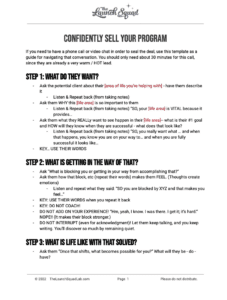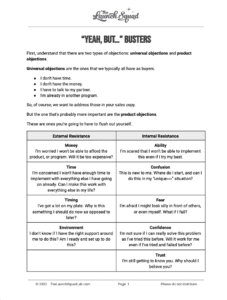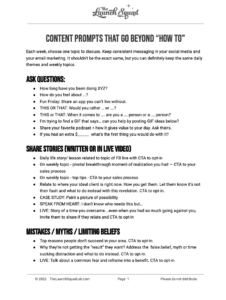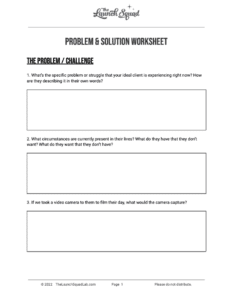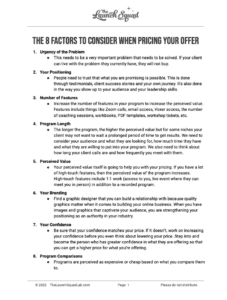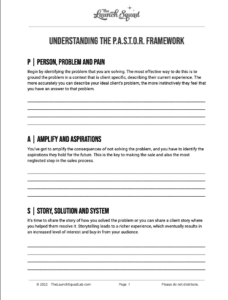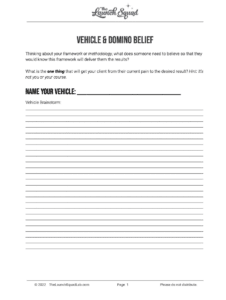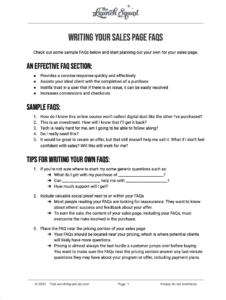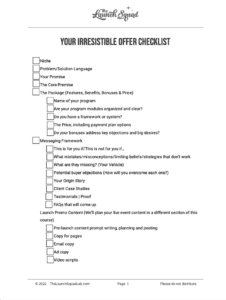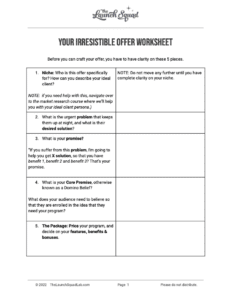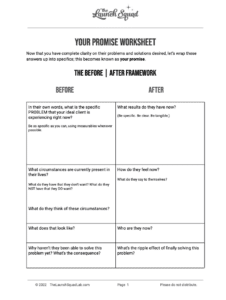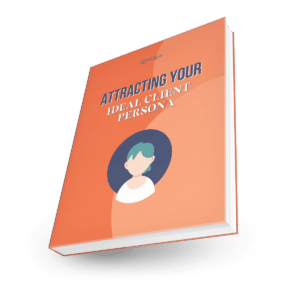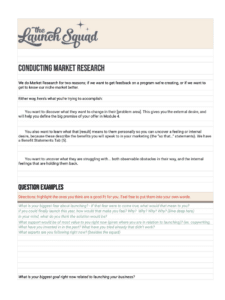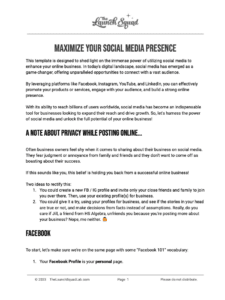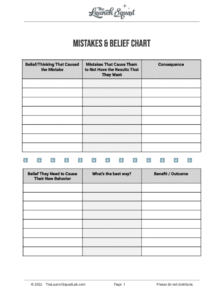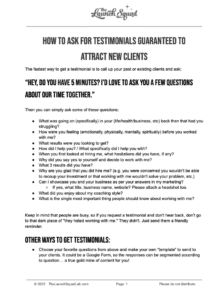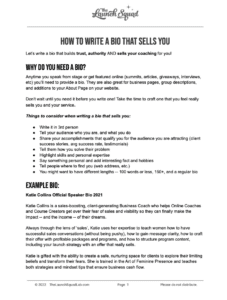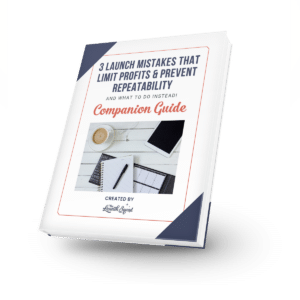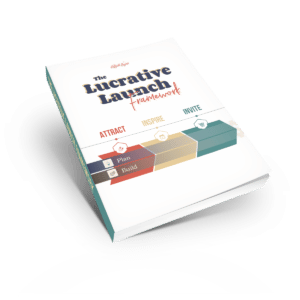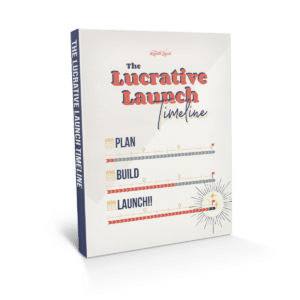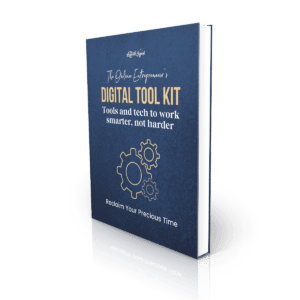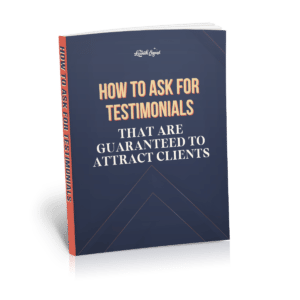So, you’ve written a book.
Your book is really, really good! You want people to read it because it can change lives … and solve problems … and help people be happier … and more fulfilled … and even entertained.
You want it to make money … but you know your book won’t sell itself.
And, you don’t really want to spend $15K for someone else to do it for you. Besides, you know you’re probably the best person to market your book anyway.
But you’re stuck! Where do you start?
Today we’re uncovering the concept that you DO have a story inside you that the world needs to hear. And, quite often, that story can position you as an expert, or authority, and help others overcome similar obstacles.
Our guest is an author, coach, and publisher.
For over 25 years she’s been working with visionary leaders, authors, and entrepreneurs to get books out of people’s heads, make them page-turners, and get them into the hands of readers. Her weekly writing workshops are often where this magic happens.
Her Quantum Shift Publishing program guides authors through the entire publishing process. She connects with you on an energetic level so she can understand your soul’s purpose, then guides you in planning for and writing a successful book. She taps into her writing, editing, and design skills to create a page-turner with a kick-ass cover. And finally, she’ll help you customize a best-selling marketing blueprint to sell as many copies as possible.
She has ghostwritten and published hundreds of books for authors and is currently writing a book about her experience as a foster Mom to 26 teenagers and a book called Blink about an abused horse for young readers.
Always an adventurer, she was an avid motorcyclist for 25 years and enjoys golfing, hiking, biking, paddle boarding and anything else that gets her out in nature.
Learn more and connect with Keren:
Read: “11 Reasons to Write a Book”
Get Social:
[00:00:00] Jeffrey: Welcome to the light in your launch podcast today, we're talking about how to increase your impact with a published book. So stay tuned.
[00:00:55] Jeffrey: Welcome back to the show. I'm Jeffrey Samano and I'm back again with Katie Collins. And today we're uncovering the concept that you do have a story inside you that the world needs to hear. And quite often, that story can position you as an expert or an authority, and it can even help others overcome similar obstacles while creating some relationships on the way.
Katie, who are we speaking with?
[00:01:22] Katie: She is an author, coach and publisher. And for over 25 years, she's been working with visionary leaders, authors, and entrepreneurs to get books out of people's heads, make them page Turners and get them into the hands of readers. Her weekly writing workshops are often where this magic happens. Her quantum shift publishing program guides authors through the entire publishing process.
She connects with you on an energetic level so she can understand your soul's purpose and then guides you in planning for. And writing a successful book. She taps into her writing, editing, and design skills to create a page Turner with a kick ass cover. And finally, she'll help you customize a bestselling marketing blueprint to sell as many copies as possible.
She has ghost written and published hundreds of books for authors and is currently writing a book about her experience as a foster mom to 20 teenagers and a book called blink about an abused horse for young readers. She's always an adventurer and was an avid motorcyclist for 25 years. She enjoys golfing, hiking, biking, paddle board, and anything else that gets her out in nature.
Welcome to the lightener launch podcast stage Karen Kilgore. We're so
[00:02:41] Keren: Thank you, Katie. And thank you, Jeffrey. Such a pleasure to be here.
[00:02:46] Katie: glad to have you.
[00:02:47] Keren: yeah, it's a pleasure. So.
[00:02:51] Katie: So we have an audience of business owners here. And so we thought we'd start off by asking, you know, what are the actual business benefits of being a published author?
[00:03:03] Keren: great question. There are many, um, probably the first one is credibility. Um, being a published author gives you, you can increase your prices. It gives you credibility. Like it puts you in an expert category. Um, where other people who don't have a book are not, and, um, exposure, speaking opportunities, bringing in new clients, um, it gets you on, on platforms and, and stages where you wouldn't have that opportunity if you were not a, a published author.
Uh, so there are many, many good reasons actually have a blog, 11 reasons to publish a book on my website. And, um, yeah, there's some good ones, so, and another revenue stream. That's another big one is your book can be a whole nother revenue stream. Uh, in addition to what other ones you have. So, um, yeah, having a book is, uh, could really elevate your business.
[00:04:00] Jeffrey: great. And I noticed like some people I've seen a trend lately of offering the book for free as a lead generating tool.
[00:04:10] Keren: Yes, it is. Um, it can often be a big glorified business card. You can give it, uh, you know, give two copies to your client and they're gonna give one to someone they know. So, you know, and for the price of publishing a book, it, you can, you know, it brings in money in a lot of different ways. So if you think of it as a business card and giving it to people in even a networking situation, they're going to give it to other people.
You've got your call to actions in the book, you've got your contact information. Um, so having a book is a, you know, it can, it can elevate your business significantly. It really. I've seen it
[00:04:51] Katie: So for those people that are listening and saying, yeah, this sounds great, but I, I don't have a word let alone a book inside of me. what do you say to those people?
[00:05:01] Keren: yes. And a lot of people feel that they think other people can write. I can never write. Um, I'm not good. Um, you know, they compare themselves to, you know, high, like. Um, James missioner or, you know, Steven King and they think I could never do that or nor, you know, nor Roberts, whoever. And, um, but that's not true.
It is not true. You have something really important to say, and only you can say it, your experiences, your perspectives, uh, nobody has them, but you, and so you have a unique voice and only you can say what you have to. So you don't have to be a, a topnotch author, topnotch writer. You just need a good editor because you need to say what you have to say.
Nobody can do it. So you get a good editor and they refine it and pull it together and you have a really good book. So, yeah, that's a big point. you can write mm-hmm
[00:06:00] Jeffrey: there something to be said about like the different, you know, nonfiction fiction, part of things like, which one's better for business and, you know, is there, um, a market for like nonfiction, how to books and business, or is there also a market for fiction books in. Hm.
[00:06:19] Keren: Yes, both. Uh, kind of depends on what you have to say, what your book wants to say. Cause, um, I'm working with an author, uh, actually several writing a non-fiction. um, and then I'm writing with several writing fiction. So depends on your story, how it wants to be told. Sometimes it's better in literally a story form, like cuz you can add and embellish things where in a how-to book, you, you know, you, you have to stick to the facts, but if you're in a, um, a, a story form fiction book, you can make it all kind.
And, but you can still teach points. You can still have call to actions. You can still. Clients in, depends on how, how the story is told. Uh, but generally, and it's about 50 50 actually, uh, fiction non-fiction. Um, but a how-to book is in a business sense, probably the better choice, depending on what this, how you do it in stories.
But even in that you've got story, you've gotta tell everything in a story form. It doesn't have to be novel type writing, but a stor, everybody wants a story. And so you teach a point in a story form, you teach another point in a story form. And so the whole book leads the reader through. So they're very similar in actuality, just one is true.
You know, one is, you know, real factual and one, you can embellish some. So it kind of depends on how, what you have to say.
[00:07:46] Jeffrey: Yeah, I can see how that like, skill would actually really benefit something like, uh, marketing, writing, a sales
[00:07:54] Katie: I was gonna say content marketing
[00:07:56] Keren: Content marketing. Yes, exactly. Yes,
[00:07:59] Katie: um, you know, and I, I know that, um, you provide, um, an opportunity where people can come and, and kind of co-work together by writing. Right. And I love that. I want you to tell me a little bit more about it, because I, I know for a fact that if you're not telling stories with your marketing, you're missing the mark.
[00:08:19] Keren: Yes. Exactly. Exactly. And, uh, a lot of people don't know how to tell the story. They'll leave out the details. And so they'll miss the, the, the, reader's not connected to it cuz they haven't given some background information or they give so much that the reader's board know, you've totally they've, you know, that's gone.
They're like ready to move. Right.
[00:08:41] Katie: years old.
[00:08:41] Keren: right.
[00:08:42] Jeffrey: This one at band camp.
[00:08:44] Keren: yeah, exactly. So you've gotta be, you gotta tell the story, know what the object of the story. What do you want the transformation? What do you want the reader to take away? And start and back it up from there and then tell the story that way. So any facts that are not relevant, just leave them out.
You know, you can, you can deal with them another way or, or, you know, if they're not needed at all, just totally leave them out. Um, but yes, I hold writing workshops. I call 'em a writing or quantum shift writing community and people come and we have a, it's a sacred space where we actually do a quick meditation and get really centered and start download.
The information that our divine source wants to give us, cuz it all comes from one source and it's interpreted through our own perspectives and our own language. But when we get that download, we don't have to work so hard. It just comes to us and we can write. So the writing workshops are excellent for, uh, writing your first draft of your book, editing your book, writing podcast and writing, uh, blogs, uh, any kind of content for blogs, your social media, anytime you need.
The in, uh, uh, a space of inspiration then, uh, that's perfect. Cause I've had people write magazine articles in there and when we're all coming together, the energy of everybody is really magnetic and fun. It's fun. Yeah.
[00:10:09] Katie: I'm so curious. So do you, is it, um, do people interact together and share their stories
[00:10:16] Keren: Sometimes we, sometimes I do that. I'll at the end, we have it's two hours. The workshops are two hours and I break it down into 15 minute writing increments. And then at the end, we, I leave some time for question and answer. So if anybody needs feedback on something, or if somebody's messing with a, a header, like a subheader.
then we'll say we'll throw it out and let's see what the group thinks. And so we'll have a little interaction time. So it kind of just depends on, on which way the class is going. Um, but yes, there is feedback. And then I also will say, you know, send me a page and let me read it. And then I'll give you feedback on how, you know, just quick feedback on how the writing style is and where you can go deeper or where you're missing it or where we need more dialogue.
Um, and so I'll, I'll do that for, for the people in the workshop. So it's very beneficial.
[00:11:09] Jeffrey: Yeah.
[00:11:11] Keren: Yeah.
[00:11:11] Katie: So, um, you mentioned, you know, being an intuitive and using that skill to help your clients. How does, how does that work?
[00:11:20] Keren: Yes. I actually get connected to the book and the energy of the book and the energy of the author, because a book will take an author on a journey. They don't even realize they're going on. You think you start the book and you think you're directing it, but actually the book ends up directing you.
And so there's two different energies and you have to get, I get connected to both of them. And then I really start knowing what the book wants to do. And is it complete or not complete? Um, does it have more to say. Are you, are we missing the reader? Is it, um, are we not giving them enough background information?
And so energetically, I literally get into the energy of the book and it's, I love it. It's it's really, and I, I can feel where it wants to go. Like, no, we're not quite there. Or we need to push it a little bit this way, or we're missing a major piece on here. That that's gonna really help the reader. So we need a whole nother chapter or this chapter needs to be at the beginning.
And so literally I'll, I'll get connected to the book like that in an energetic way. And the book it's better, the book is better. I make books better just by doing that.
[00:12:31] Katie: Yeah. Yeah.
[00:12:32] Keren: Yeah, I do. Yeah.
[00:12:33] Katie: cool.
[00:12:35] Jeffrey: who, who would you consider your ideal client? Like what, what is the. Profession or niche that you really, really love working
[00:12:48] Keren: Um, that's a great question. I love working with, um, highly energetic visionaries who have something really important to say, and they're really, really good at what they do, but they may not, might not be so good at how to say it, how to write it. And so they're, they know exactly they're, they're highly gifted and skilled in their, in their line of work.
Um, but they need help knowing how to express it for, for the general audience to absorb it. Um, they are intuitives visionary leaders, change makers, thought leaders, that type of a person is, is I love working with. Um, highly, highly, um, intuitive and, um, really smart. They have something important to say and I love helping them get it said.
[00:13:42] Jeffrey: describes me to a T
[00:13:46] Keren: it. that's great. and they're so, and they're busy doing what they're doing. They're busy in their, in their life. and they don't have a lot of time to put into the, you know, the writing of it. Um, they need some, they need to know how this book should go and they wanna get it done as quickly as they can.
Um, so put me on that path. What's what do I need to do next? And, um, and that's, that's, that's my ideal. That's who I love working with.
[00:14:12] Jeffrey: Okay. So let's talk about that path. What, what is the book writing process? Like?
[00:14:20] Keren: Yes, it's a, it, it can be, uh, there's a lot of moving parts. Let me just say that in writing a book, there's a lot of moving parts. So I always start with, um, a timeline. And so the first thing we do is we choose the book's birthday and it's an energetic connection of when that book wants to be born. And what a good day is.
And you can, we, I know we know exactly when we've hit it. then I back up the entire process on a literal on a timeline. So, you know exactly date by date, by date, what you need to do. And we start with, um, the writing of the book, first draft, second draft, third draft editing, uh, and then go into the cover design, the interior layout, the market.
and the post launch, the book launch, and then the post launch. And so I, I literally have a date by date, every step, you know, exactly what to do and when it's due. So you don't have to, you don't need to worry about things that haven't happened yet. You just need to worry about right now, the next, you know, week or whatever on your timeline.
And, um, and it just alleviates so much stress because you don't feel like you're missing something. What am I missing? I don't.
[00:15:38] Katie: right. I, I love, like, I think what, what you do for authors is what we do for coaches who are launching in that we are steering the ship. Like we are directing what's happening in the person just has to show up and, and hopefully stick to their deadlines.
[00:15:54] Keren: exactly
[00:15:55] Jeffrey: And, and I notice
[00:15:56] Keren: to make it. Yeah.
[00:15:57] Jeffrey: your, your, I, I love how you, how you stated that because you're essentially starting with the end in mind, right. setting a future date and you're working your way backwards. And that's exactly what we do in the launch squad. We, we look at the launch date and the offer and work our way all the way to the lead
[00:16:13] Keren: exactly. That's exactly right. And it's the same thing in book publishing and I always, yeah. And, and I to do it, um, if you have a year, that's great. It gives you some breathing room. If you have nine months, that's ideal. Anything shorter than that, you're gonna feel a little choked, cuz you need about, if you, if you have got your book written, we can do it shorter.
But if you haven't, we need at least nine months to a year. Otherwise you're gonna feel a lot of pressure that you know, I for, but, but it,
[00:16:45] Jeffrey: that I feel pressure in the nine
[00:16:46] Katie: Well, I, the first that comes to my mind that I know you're probably asked all the time is how many hours per week do I need to dedicate to this
[00:16:55] Keren: Yes, exactly. And I would say at least 10. Okay. At least 10. Yeah. And my writing workshops are three times a week and that's two hours each. So there's six right there. If you come that. um, and then, you know, a Saturday or something, so you can still, you know, run your life. Cuz everybody's busy. You're not just stopping to write a book, you're fitting it into what you're already doing.
And um, and so that's why I do those workshops, the, the writing community so that I give people an opportunity to come and just write and you get a lot done a lot in that time. But, um, yeah. So nine months is, is a comfortable because I have a three month book launch. And so your book needs to be kind of done writing and editing and in the proofing stages so that you've got the bandwidth and, and mindset to be able to go into the book launch, um, because then you're gonna be doing all the marketing for it.
Um, and the marketing is not just selling the book it's bringing in new clients, it's getting, you know, podcast, speaking opportunities. It's many different things. Cause I believe your book, your book needs to bring you business. It needs to bring clients to you.
[00:18:05] Katie: Amen. So let's, let's talk about that because, you know, I come across a lot of clients that have a book and they've got, you know, boxes and boxes of their book in the garage and they're, they're just not selling. Right. So it's like, I launched my book and then flopped. So tell
[00:18:24] Jeffrey: Or
[00:18:24] Katie: what.
[00:18:26] Keren: Or they didn't. right. Yeah.
[00:18:28] Katie: So what, what is involved in the planning for that book success so that it's not launch flop,
[00:18:34] Keren: Yes. And that's often the case because they don't have a plan and you've seen it. seen it in, you know, if don't have a plan, you're not, it's not, you're not, it's not gonna, it's impossible. You gotta have a plan. And so I have a 90 day book launch blueprint, and it's literally a self-guided course where you can launch a book.
Even if you, the book is published last year or five years ago, you can relaunch it, relaunch the. um, and so F I have a nine it's, it it's actually four months long, but 90 days is the big launch and then a month of follow up. So I give a whole month of follow up. It includes social media strategies, a whole four months of social media strategy, um, all the email campaigns, and when to send them a whole timeline on what to do when, um, and, and it it's, it.
It's meant for people who have, uh, written a book that didn't sell itself. And there are a lot of them . And so it gives you the whole marketing plan all in one long, uh, timeline. So you know exactly what to do when. And, uh, it can be for a book that, um, you know, that you're writing currently and then it fits right into that plan.
Or it can be one you've already launched. My, my feeling is that people need to launch their book at least every year, maybe every other year. Depends. You relaunch it and you relaunch it and you relaunch it. The more you do the, the marketing on it, the more successful it's going to be a book, doesn't have a lifespan and then end it's, know, you have to keep, you have to keep getting it in front of people.
People have to know about it. And.
[00:20:15] Katie: do you recommend they do a new addition each time
[00:20:18] Keren: No, not necessarily. Yeah, not necessarily. They don't have to, unless they, you know, and a lot of, a lot of times they've learned new things or I wished I'd said it this way and yes, you can definitely change the interior or add, you know, or, and then, uh, at the end of my, at the. The fourth month of the book launch is, um, getting awards, applying for literary awards.
And so I give you a whole thing on literary awards. So if you win those literary awards, you might wanna redo your cover and put the emblem on it, you know, and then you would wanna re re you know, upload a new cover, but that doesn't change the addition of it. It's just, you're uploading something new. And so, yes, you can do that without any problem.
[00:21:02] Jeffrey: Okay. This opens up kind of a can of worms. And I'm wondering if you could, you know, high, high level perspective kinda. Outline that launch and promotion, just kind of a high, high level. Don't give away any of your secrets, but, uh,
[00:21:18] Keren: launch, launch. Yeah. The launch is designed to bring in $10,000 in 90 days. And so the first thing we do is we set the date, the launch date, and I give you the timeline to back it all up. And then the second thing we do is I give you very clear, very distinct instructions on how you can make that 10,000.
Is it three new clients? Is it getting on two speaking stages? Is it selling how many books on Facebook, how many book signings? And so we go through and it's actually a spreadsheet and we'll figure out how you can make 10,000 in 90 days. And you're the only one who knows who could, who can do that. I can't tell you that.
[00:22:00] Jeffrey: Yeah.
[00:22:01] Keren: That's your that's. You have to decide that, um,
[00:22:04] Katie: include selling business services or is that $10,000?
[00:22:09] Keren: No, it it's business services, cuz your book is a business card bringing in new clients. And so it's bringing and so that in that 90 day launch, you could bring in five new clients, three new clients, one a month, three a month, whatever. And so we decide and then your launch focuses on how to do that. And so we have, uh, you know, email campaigns, social media campaigns, follow up emails, um, getting on, I have a whole list of podcasts, like, you know, like yours here.
Um, and so all that kind of exposure all adds up to new clients and book sales. Your book is, uh, brings in revenue in more than just book sales.
[00:22:50] Katie: Mm-hmm I think that's the important thing for people
[00:22:54] Keren: It really is. It's not just book sales. And then when I'm working with an author, I'll make sure that the book has those call to actions in it. So people know what you're doing.
A lot of people don't think like that. And so your book, they, you know, you've written your content, but they, nobody knows what you do. How do they know how to work with you? And so I'll make sure that books have that in there.
[00:23:14] Katie: Mm-hmm
[00:23:15] Jeffrey: Okay. I wanna step back just a second, cuz I, I, I happen to know an author, but she doesn't li she doesn't have a business per se. She's written a children's book. Right? Does the same model apply? Like can, can somebody who like, I, I, I, I don't wanna minimize it, but if I said, oh, I just have a book. That's all, I'm, you know, I'm not coach.
I'm not a, you know, I don't have other things to sell.
[00:23:40] Keren: mm-hmm
[00:23:41] Jeffrey: How would that model change?
[00:23:43] Keren: Well, what it depends on what the person wants to do. Cause if they don't have a business, but they wanna speak or they want to go to, they wanna speak at book clubs or they want to, um, generate more online business or, you know, kind of depends on what their goals are. Um, because there's ways besides just writing, um, you know, just selling a book to bring in money.
So really it depends on their goals.
[00:24:11] Jeffrey: Okay.
[00:24:11] Keren: Um, if it's just a ch and all they wanna do is sell children's books, then we would, then we would put more effort into the online marketing and exposure, getting them exposure then, then looking at bringing in new clients. Um,
[00:24:25] Jeffrey: okay.
[00:24:26] Keren: does that make sense?
[00:24:27] Jeffrey: Yeah. Yeah. I love that. Taking notes, calling out Jackie F on this call right here.
[00:24:35] Keren: Yeah. So it depends on what their goals are. And like I have one, um, client I'm working with and she is writing a. Um, a book on bipolar, it's a novel and it's be on BI, a bipolar relationship, um, that she was in. And so she's writing in an, a mystery novel type format. Um, and it's not it's, she doesn't have a business that's related to that, but she, but it is going to bring her a lot of exposure in her business.
Um, and so it might not be direct clients, but it's giving her great exposure, just, just becoming a published.
[00:25:11] Jeffrey: And is her business, uh, related at all to
[00:25:15] Keren: business is, is proofreading and editing type stuff. Yes. Um, I know, but her book is going to bring her exposure on that. And so, you know, so it might not bring one, you know, specifically a new client for coaching, but it's going to give her exposure in the, in the, uh, publishing world.
[00:25:36] Jeffrey: I hadn't even considered that, that an unrelated book to your business could act could benefit through exposure.
[00:25:45] Keren: Yeah. Yeah. Cuz it's given and credibility cuz you're an author. Um, and so it's given her credibility for what, you know, proofreading and editing and so yeah, exactly.
[00:25:56] Jeffrey: I love that. I love huge. That's
[00:25:58] Keren: Yeah.
[00:25:59] Katie: I like, um, I'm kind of moving backwards a little bit, but I'm thinking about this ghost writer thing, like at, at what point do you look the author in the eye and say, please let me ghost write this for you.
[00:26:12] Keren: yes, yes, yes. I can't tell you how many times I've come to that and it's like, you are working way too hard at this. Um, you know, yes, totally. And I am writing a go. I'm doing that for an author. Um, she doesn't have time. And, um, so the ghost writing process is. And people think probably the biggest thing is they think, well, I'm not writing it myself.
I can't really put my name on it, cuz I don't feel like I'm writing, but that is not true. It's her story. Totally her story. Um, and she's telling me the story. So what I do is I'll do an interview and I'll pull the information out with questions, um, dialogue. And how did that feel? And I'm, and I'm get the whole thing and then I'm, then I'm writing it for her in her own language, using the own, her own words, her own expressions, her own emotions.
Cuz I've got the feeling of those emotions. I've connected to 'em. So I'm not gonna lose that in the writing. So I keep her voice the whole time and, um, and then when we're done, then she goes over it and, and edits the whole thing. So if she doesn't like the way something says, you know, change that word or change that sentence.
Um, so you definitely, she's definitely writing the book. She's just speaking it to me. instead of having to type it on this, you know, and she doesn't, she doesn't have the time she's running a big business. And, um, and so for her it's well worth the time and the money to be able to get the book written, at least get the first draft done so she can edit it.
Mm-hmm So the key is the, is the interview process in that and pulling out the right information.
[00:27:52] Katie: Mm-hmm . And so time wise, when we were asking earlier, you know, how much time do I dedicate to this project? If, if it's being ghost written by you, what's the time.
[00:28:04] Keren: generally do the same timeframe. The nine about, about the nine month timeframe on it. Um, actually give myself a little bit more time because I'm the one writing it. So I have more of my own time involved. um, but then, uh, they get the first draft. So what, what I'm doing is ghost writing the first draft.
So then they pick right up on that on, um, draft two, you know, version two, and then they start editing version two. So they're pretty much the same timeframe. Um, so on that, and version two is generally not as much investment as writing it time wise. Um, You've got it pretty much refined. You're just going through version two.
You know how that is? Um, you're making some changes, but not massive. You're not making massive changes. And, uh, and in the ghost writing, I work back and forth. How does this chapter sound? You know, how does, so we're not like writing the whole thing and then they see it. It's like, oh, that's not even close.
Um, I work with them closely. So it's like read this page. How do you feel about this scene? Um, you know, what was the, what was the emotions you were feeling when you were in that scenario? I wanna make sure we capture those. Um, and so that it's a, it's a working relationship, but a lot more time on my part than theirs.
[00:29:24] Katie: mm-hmm
[00:29:26] Jeffrey: awesome.
[00:29:27] Keren: it's a huge service for people. Uh, especially business owners who are very busy they're, you know, they've got more to do than to sit and write a book. Um,
[00:29:38] Katie: Especially it's not their skillset, if you will, it's not zone of genius,
[00:29:42] Keren: yeah. But they can tell the story. They can tell story and it comes from their heart and they're, you know, and it's their story.
Totally. Their story. Didn't I'm not, you know, I'm just telling it in their words, so, yeah.
[00:29:57] Katie: I wanna go a little, um, you know, personal here with you because you're writing a story about being a foster mom to, I don't know, 2016 teenagers. Was it? Um, I, first of all, wow.
[00:30:12] Jeffrey: I wait, rewind that.
[00:30:15] Keren: did
[00:30:15] Jeffrey: say? 2016 teenagers.
[00:30:17] Keren: Yeah. Over nine years we had 26 teenage foster kids and, um, they came with all kinds of issues, all kinds. The stories are actually quite entertaining. Um, some very sad, very sad, but some are, are really good. The book is called. Can I call you mom?
[00:30:35] Jeffrey: yeah.
[00:30:35] Keren: And, um, and so I'm hoping that, yeah, I'm, I'm so busy publishing other people's books.
I gotta get time on my own. I need a couple weeks. , you know how that goes?
[00:30:45] Katie: certainly do.
[00:30:46] Keren: the cobblers kids have no shoes,
[00:30:47] Katie: yeah.
[00:30:49] Keren: um, but yes. Yeah.
[00:30:52] Katie: like, tell me about like what inspired you to do that?
[00:30:56] Keren: Oh, the foster care, we had two children and we wanted more. And, um, doctors told me that I was high risk. I shouldn't have more children. And so our kids got to be. Ten nine, ten, eleven years old. And we saw, and I started seeing, coming in contact with, um, a lot of children who were really in a crisis, really a crisis.
And Michael and I looked at it, my husband and I looked at each other and we said, well, we can take them in. We can help them for a while. And so we, we did, we started taking in and, and, um, our first couple. We started doing therapeutic foster care originally, and that was the kids would live with us for the week.
And we would work with them and their parents to try to get them reunified. And that was our heart was to get the kids back home with their parents. And so they would come live with us and we would work on all kinds of issues with the kids. And then we would meet with the parents and work on issues with them and say, well, this is what the communication gap is, and this is what your son's really trying to say.
And they would say, but he's doing this. So we would, we would bridge that. And, um, and then I don't know, two turned into 10. That turned into, I dunno, we just kept doing it. They kept and, and, and, uh, we were on TV shows. We were one of the only white families doing foster care. Most were most were, uh, lower income, black families who, and most, a lot of the kids were white.
A lot of the kids were Hispanic. um, we had all kinds of ethnicities and loved all of them. Um, one of my favorite was, um, herb and he was a great big African American boy who I just loved, um, looked. I just, I feel very emotionally connected to him even now. And, um, he would go, he, we would go places and we had a van and we would go places and he would sit in one window.
And lean his head up against the window and there would be a big grease mark on the side of the window from his hair. He had this great big Afro with all this product and it, and there was this grease, big grease mark on the window. And he had to be moved for a crisis with his father. Uh, it got to be a dangerous situation on our part, but, um, that we, none of us wanted to take that grease mark off the window.
We left it there for, for probably a couple months. because we thought that's herb spot, you know, so they all became very dear to us. And, um, and yeah, it was quite the experience we've been, I did a lot of, um, IEPs, individual education plans with, with their teachers, did all kinds of court. Things went to, I don't know how many times I went to court with them and, um, you know, meeting with their social workers and just really got involved in their life.
[00:33:50] Katie: Yeah. were on their team.
[00:33:52] Keren: I was on their team. Yep. was on their team.
[00:33:55] Jeffrey: I gotta that, that sounds incredibly challenging on several, several layers,
[00:34:00] Keren: Yeah, it was
[00:34:02] Jeffrey: right? I mean, you you're, you're building bonds with these children and then I guess then, then they leave so
[00:34:09] Keren: Yeah, yeah, yeah. And the,
[00:34:11] Katie: what length of time did was an average stay?
[00:34:14] Keren: Um, some, some were there for nine months. We had 'em for nine months. Some we had 'em for maybe two months kind of depends. Um, but generally nine, the therapeutic was nine months. And so we would have to have, uh, cuz we needed that much time to get some of their family issues sorted to get them back home.
Um, and so yeah, so nine, nine months or so, but some were shorter. Um, Yeah. So I've lots, lots and lots and lots of stories. I can't
[00:34:46] Katie: I,
[00:34:47] Keren: So many stories.
[00:34:48] Katie: I, and I love the title of your book and I, I look forward to reading it. It's, it's really an issue that's near and dear to my heart. I'm drawn to it, you
[00:34:57] Keren: Are you okay? Yeah, yeah,
[00:34:59] Katie: Um, I just, you know, I wanna help a teenager, like figure out how to get into college, right. my mom did for me, that I'm realizing, not everybody has that, know,
[00:35:10] Keren: And one, one of my goals in it is to get, uh, families more involved in the kids, you know, be a mentor, get out and just mentor, even if it's one kid a year, just, you know, and there're programs where you can do mentoring. Um, and it's not, you don't have to have 'em live with you. You just meet with them once a week or something.
Um, and, and yeah, because there's a lot of at risk kids that need a stable adult. To just bounce things off of and, and listen, have 'em listen, active listening, um, empathy, just feeling empathy, not pity, just, you know, God, your life really is hard. It really is. I see that. I witness that. You're not, you don't even have to change it.
You just have to witness it for So, yeah. So that's a lot of what I'm trying to communicate in this book is, uh, that support of the kid itself, the child itself as an individual. Um, and yeah, so we have, we had some white colorful kids come through our, come through our home. They're very, very colorful.
Yeah.
[00:36:15] Jeffrey: is amazing.
[00:36:16] Keren: I remember one, uh, one time we did a lot of, um, drug testing. The kids had lots and lots of drug testing. And so one, uh, one kid came and he had the drug test. He was at home that weekend and, um, and he had a drug test on Monday morning. And so I drove him to the clinic for the drug test and, uh, he came, he went in the bathroom and did his urine sample and came back. And, um, and then the social worker said, well, we found L S D in your no cocaine. We found cocaine in your urine. He said, well, I don't, I've never done cocaine. I just smoked marijuana. And, uh, what he had done is taken his friend's urine and taped a bag to his thigh, to I, to keep it warm. And then it gave, that gave that urine sample to the social worker.
All he was doing was marijuana and he got convicted of cocaine and it was like, what? And I'm thinking, what were you? He's in a little plastic bag strapped to his thigh. And I'm
[00:37:22] Jeffrey: Oh, my God.
[00:37:23] Keren: were you thinking? What
[00:37:25] Katie: that sounds teenager.
[00:37:27] Keren: A teenager. Exactly. so, yeah, so we got stories like that is like, you know, they're like, wow, you could have done that a little better.
know,
[00:37:36] Jeffrey: know your friends
[00:37:38] Keren: you could have done that a little better. Yeah. So what were you doing this weekend? You know, anyway, I can't imagine this scenario of here pee in this bag and let me seal me, you know, the whole thing is like very
[00:37:49] Jeffrey: What they had to do to get
[00:37:51] Keren: to get that
[00:37:52] Jeffrey: feet
[00:37:52] Keren: I know to get that. So anyway, one that's
[00:37:58] Katie: You'd think friend would've been like, I don't think you want mine.
[00:38:01] Keren: No, but he, he set him up. Yeah. He up.
[00:38:05] Katie: oh my gosh. Well, thanks for sharing that. And I look forward to that book you know, it's just, um, I, I just love, uh, hearing about people's kind of personal perspective as well as their business, you know, it's like, you know, you're a motorcycle rider, we both live in Colorado, so just the love of the outdoors.
And, um, you know, I think that just helps people connect. You know, if somebody out there is thinking, I would love to write a book and it's just like, they, they can connect with someone like you. I mean, obviously you've got a huge heart, um, you know, and you're adventurous and you know, you've, you're proving that there's so many stories to tell.
It's not even single story.
[00:38:45] Keren: Yes,
[00:38:45] Katie: there's so many stories to tell in different aspects of our lives and the lessons that we've learned. And, um, you know, I, I always love to tell a story about, uh, learning to snowboard a couple stories about snowboarding and again, like what does it have to do with business?
But one was, um, me running into somebody maybe third day out on the hill of my life. And he says, how's it going? And I'm like, it's great. I haven't fallen once. And he just didn't miss a beat and said, well, then you're not trying hard enough.
[00:39:13] Keren: huh? Yes.
[00:39:14] Katie: know how that translates into
[00:39:16] Keren: Yes. And to absolutely. Yeah. Being an entrepreneur is one of the hardest things you can ever do
[00:39:22] Katie: yep,
[00:39:23] Keren: the most rewarding, but telling you, you need all the support you can get. You really do.
[00:39:27] Katie: You know, and if you're not, if you're not falling down,
[00:39:30] Keren: You're Yeah. Hard enough. Very good.
[00:39:34] Katie: And another, another one was learning to ride in the trees. And I kept looking at the very thing. I didn't wanna hit AKA the tree and my sister would tell me, you gotta look at the open space, look at the open space and then point your board in that direction.
And again, it's are you gonna look at your obstacle or are you gonna find your, your path, you know, um, Yeah. Yeah. So I just think people just don't think, you know, they're like, I don't have any stories inside of me. It's like, well, you can talk about something you love doing,
[00:40:03] Keren: Exactly. Yes. And those stories are huge and, and a short story, just a little, you know, few PA it doesn't have be. 2000 words, be, you know, 500 and that's perfect. Um, and that's an excellent blog post and that gets you out. So there's lots of things to tell like that. Absolutely. Uh, everybody has a story and, and people want to read them.
They want to read them.
[00:40:29] Jeffrey: I love My, my one request for you, Karen, is that when you do release your book, that you, uh, also have an audio book, cuz with my fifth grade level reading skill, really need that audio component.
[00:40:43] Keren: I
[00:40:43] Jeffrey: that's why I like, uh, Jackie favors, uh children's book so well, cuz they're right at my level.
[00:40:48] Keren: well, exactly. And, and I actually, when I'm working with authors, have them write at a fifth grade level.
[00:40:54] Jeffrey: Oh.
[00:40:55] Keren: so yeah, unless it's a really academic book. I'm ha I that's the level I have 'em because that's where people read and yes, I.
[00:41:02] Katie: marketing.
[00:41:03] Keren: It is exactly. And you have to be at that, which is, you know, what's that say about our society, but that's, it is what it is.
Um, but yes, when I, when I do books, I always promote the, the print, the ebook and the audio, because a lot of people will buy both. I personally buy the Kindle and the audio, the audible, um, because I read between both. Um, and then I, I would buy the print just to put on my shelf cuz I wanna keep it. Um, so people might buy all three versions and so you've got three sales with one customer.
[00:41:35] Katie: Do you have your authors record
[00:41:38] Keren: It depends on their voice and it depends on the story. Um, but yes, if it's a biography and they've got a good, a good recording voice, then yes, I would like them to do it themselves. Um, if they don't and the story depends, I've got people who can I, people who do the voiceovers, um, and can read it for them.
So, but yes, an audible is a very important part. I agree.
[00:42:02] Katie: Glad
[00:42:02] Keren: I agree. I own hundreds of audibles, so yeah.
[00:42:07] Jeffrey: I've had a subscription for years. only way I can get books in my brain.
[00:42:11] Keren: know. It's good. Isn't it? Yeah, good. But then, but then you have, you know, they're talking about something, especially in like a how-to book and they're giving you five bullet points and you wanna copy 'em down and can't cuz they're in audible.
[00:42:23] Katie: on a walk
[00:42:24] Keren: yeah. On or in your wanna walk and you tag it, then that's why you need the Kindle or the print version, cuz you wanna go back and capture that and it's well worth. You know, having both versions to, to be able to do that. That's that's, that's been my experience. So
[00:42:39] Jeffrey: I love that. I, I often find myself on a walk, hearing something awesome. And I'm like, ah, I wanna write that down. Oh, dang it.
[00:42:49] Keren: Yeah. One of my authors, uh, wrote her whole book on a walk. She literally walked around a lake. Um, on as her regular, um, exercise and every day she would record in her phone, her about raising children and she would record every day, record something. And then she says, you know what? I have a book here.
And so that's how her book became born. And so when you're walking and you have inspiration or like for me, and when I'm writing my motorcycle, I'll I'll have ideas. I just press a little button on my phone and record. And, uh, it's a great way to capture your, your capture, your content.
[00:43:27] Jeffrey: that's
[00:43:27] Keren: And once you start, and once you start writing and you start allowing that download to come to you, more ideas start coming more and more and more.
[00:43:36] Jeffrey: Yes. Opening a
[00:43:37] Keren: after story. It does story after story, after story starts coming. And, uh, if you don't capture it, you you're, you know, you're, you're missing out. Your readers are missing out. So get it documented.
[00:43:50] Jeffrey: and, you know, that's, that's something good to bring up is, um, like if, if you're not a good typer,
if if you don't have keyboard skills. Yeah. Like there's all different kinds of ways to get those thoughts out. Yeah.
[00:44:05] Keren: Just get it transcribed and go to, you know, transcription software and have it, have it transcribed into words for you and then start working on it. You don't have to type every character. lots of ways to get a book written. And the easy we go, the easiest path, whatev what works for you and let's path, you know, choose the path least resistance, huh?
Absolutely.
[00:44:28] Katie: know, it's funny, that's true for writing and it's reading, you know, like we went to school and it's like, you know, you're damned if you don't sit down and know how to read a book for an hour, right. And for. I mean, I actually did enjoy reading, but I enjoy audio books much better these days.
It's just the way I like to learn. And I just think it's so important for us to give human beings permission to be who they are instead of the institutional education system that says there's something wrong with you. If you don't wanna sit there and read a paper in your hand, , you know?
[00:45:01] Keren: totally.
[00:45:02] Jeffrey: square hole, fit in the
[00:45:05] Keren: Yeah. And a lot of people like a paper in their hand. Um, I, I personally find it kind of awkward
[00:45:10] Katie: Yep. Yeah. My mom feels the same way.
[00:45:13] Keren: I like to, I like my Kindle and I swipe the pages and, know, I got 300 books on one little device and, um,
[00:45:21] Katie: know, the like very thin,
[00:45:22] Keren: I know and that's for me,
[00:45:24] Katie: a book. Yep. Yep.
[00:45:25] Keren: then I like my bookshelf and I like my books on the shelf.
So I'll buy the book too. So I'm. Yeah. So any author, I pretty much buy all three versions
[00:45:34] Katie: Yep. Well, I think that's great too, cuz you're really supporting the
[00:45:38] Keren: yes,
[00:45:38] Katie: put this in your you
[00:45:40] Keren: Yeah, exactly. Exactly.
[00:45:43] Jeffrey: one quick question. Uh, what kind of motorcycle do you have? Oh,
[00:45:46] Keren: I have a BMW RT, 1200 RT. It's a touring bike and it's um, yeah, it's a big, it's lovely. It's
[00:45:55] Jeffrey: That's not the same that, uh, Ian McGregor did his yeah. Yes. Oh my God. Those are
[00:46:02] Keren: no, they had, that was a, that was a, um, a GS that was a GS BMW, GS. This is more of a street bike. Um, but yeah, wasn't that a good show? I
[00:46:13] Jeffrey: I love
[00:46:14] Keren: was fun. Yeah, that was But yeah, we have, um, my husband and I both have, um, BMW RTS, and, um, it has, uh, cruise control and heated grips and a heated seat and a, a windshield that adjusts.
If it's, you know, it's got, lovely bike. It's a lovely
[00:46:32] Katie: sounds luxurious.
[00:46:34] Keren: It is very comfortable and you could ride a long way
[00:46:37] Jeffrey: ha, have you considered an electric bike Mo moving to an electric bike?
[00:46:41] Keren: I have, uh, uh, yes, I, I wanted one. I wanted the rad, I was looking at the rad bikes. Um, but then I bought, you know, another motorcycle so a bit on
[00:46:53] Katie: I'm I'm going the e-bike route,
[00:46:55] Keren: I know. It's lovely.
[00:46:57] Katie: the city of Denver is giving us, um, rebates. have to, you have to buy from a local bike shop, which I love, um, but you know, 400 bucks And I love that. So I'm waiting for the rebates to come back out. They ran out. Um, quickly. Um, but yeah, I'm, I'm excited to get, uh, one of
[00:47:16] Keren: Yeah, the e-bikes are great, especially Colorado, cuz the Hills getting up to Hills is no joke.
[00:47:22] Katie: just that commute to work, you know, who wants to show up with a sweaty face? You know what I mean?
[00:47:28] Keren: that's
[00:47:29] Katie: Yeah. So, well, Karen, we appreciate your time. I wanna know if there's anything else that you feel like, um, you wanna share that would wrap this episode up or make it feel complete for you?
[00:47:42] Keren: the fact that everybody has something to say
[00:47:45] Katie: Mm-hmm
[00:47:45] Jeffrey: Mm-hmm
[00:47:46] Keren: don't miss it, don't miss it. You know, if you've got something that you feel really compelled churning in you and you have a message, then get it said,
[00:47:56] Katie: mm-hmm,
[00:47:57] Keren: get it out,
[00:47:59] Katie: love it. One of our taglines is never launched without a team again. And sounds like yours is kind of like don't write a book without someone helping you through that.
[00:48:09] Keren: Yes. And I've had, um, a lot of my clients will say, I do not know how people do this without a coach. Um, there is just so many things that could go wrong
[00:48:18] Jeffrey: And even, even in this discussion right here, it's clear how important having a guide is.
[00:48:24] Keren: Yeah, it is, it really is. And, uh, knowing, you know, just the, the sense of am I missing something? I don't know, something should be, I should be doing something. What is it?
[00:48:35] Jeffrey: What should I be planning for? What didn't I of down the turn the
[00:48:39] Keren: Yeah. And so just having a coach tells you, you know, exactly what to do through the whole process, but yeah, the biggest thing is if you have something to say, Say it
[00:48:51] Jeffrey: it. Awesome. H how can people, uh, get ahold of you? Uh,
[00:48:54] Keren: Uh, my website is quantum shift, media.com quantum shift media. And I do have the 90 day book launch, uh, coming out. Um, probably I think July 7th is my launch date on that one. And, um, I'm also doing a masterclass on, um, SEO and it is, um, it is not how to do SEO. It's not like I'm not teaching you. I'm just teaching you the importance of it so that you know, how, and that's for book, you know, that's how to sell your book, how to sell whatever you're. You know, your widget, whatever you're selling, you need to have, you need to have an understanding of what search engine optimization is so that people know how to type in what they're looking for. Um, and so I'm calling it the magic of metadata keywords,
[00:49:48] Jeffrey: I love that.
[00:49:49] Keren: the magic of metadata and keywords. And so I've got a, it's a free masterclass I have coming up and, uh, it'll help tremendously just giving you a good overview.
Of how to market yourself.
[00:50:02] Jeffrey: Awesome. And, and you have links for that? Now we can put those in our show notes.
[00:50:06] Keren: Um, yes, I have the link for that.
[00:50:08] Jeffrey: Awesome. We'll get those from you.
[00:50:09] Keren: Okay,
[00:50:10] Jeffrey: them in the show notes. Awesome.
[00:50:12] Keren: So yeah. I'm I love helping people be seen and heard and it's been a pleasure talking with you guys really
[00:50:18] Katie: You too. You're amazing person. We appreciate your time. And, um, you know, I, I really feel every time I talk to you because I am one of those people that says, nah, I just don't have a book in me.
[00:50:31] Keren: huh?
[00:50:31] Katie: but, but every time I talk to you, I'm like, well,
[00:50:34] Keren: well maybe I
[00:50:34] Katie: I do
[00:50:35] Jeffrey: Yeah, maybe maybe it's buried in
[00:50:37] Katie: So I appreciate that. Yeah.
[00:50:40] Keren: Yeah. That's great. Very good.
[00:50:41] Katie: so many others. Yeah. right,
[00:50:43] Keren: is. It is. All right, blessings. Very good. Okay.
[00:50:46] Jeffrey: so much. And thank joining us and thank you dear listener for joining us. And if you enjoyed this episode, please leave us a five star review and hit that subscribe button. And you can check out all the show notes on how to connect with Karen and get her awesome free gifts at the launch squad, lab.com/episode 77.
We'll see you next time.
Be the first to know
Enter your name and email and we'll let you know when new episodes release.
About the Show
The Lighten Your Launch Podcast is for Coaches and Course Creators who want a lighter online launch experience. Maybe you’ve done a few launches already, and feel exhausted just thinking about it! Or, it’s been one of your goals, but you don’t know where to start.
Tune in to learn from our team of experts, The Launch Squad, who aren’t afraid to dig into all aspects of launching: sales, strategy, technology, mindset, funnels, and even a bit of woo to get you through the toughest times. Let’s put a stop to perfectionism and procrastination, and finally take your launch from intimidating to money-making!

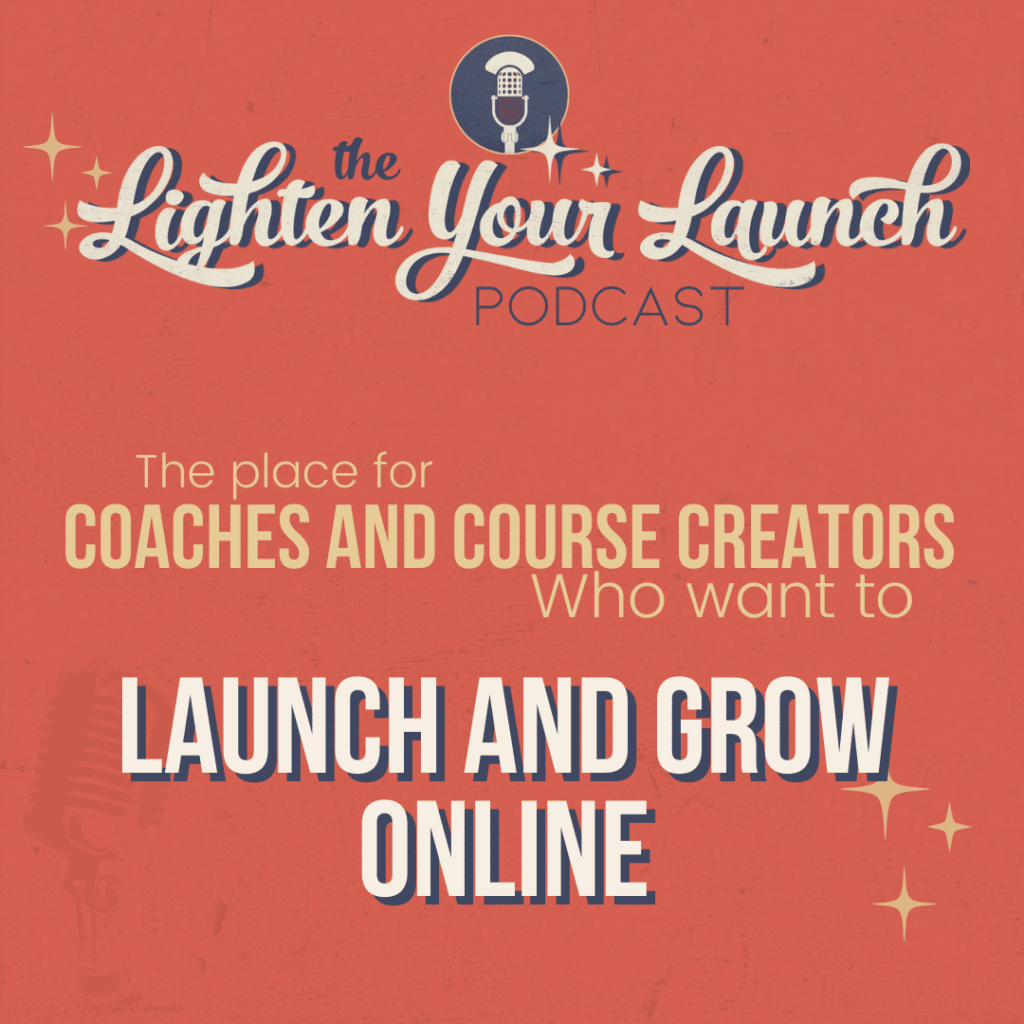
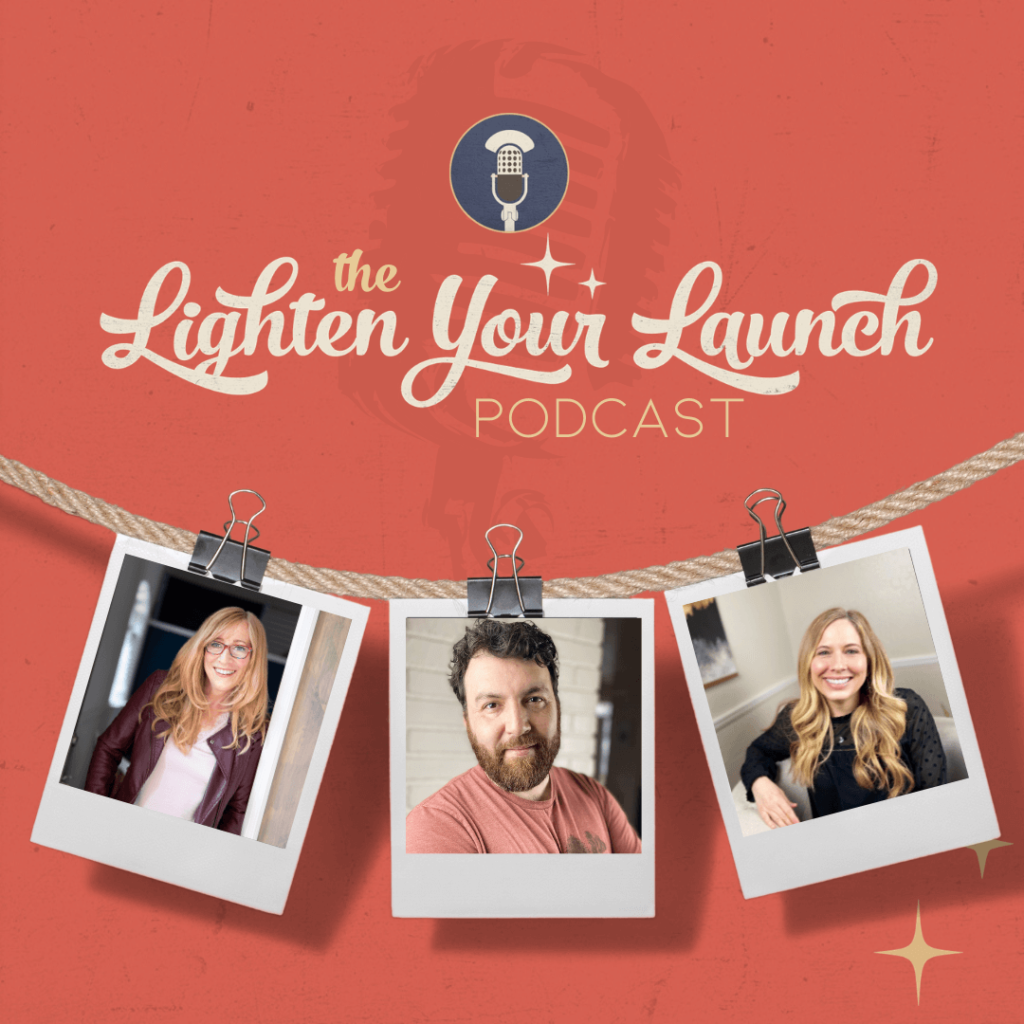


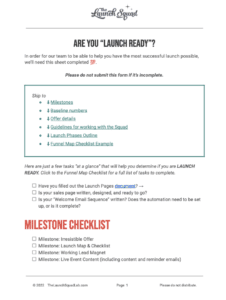
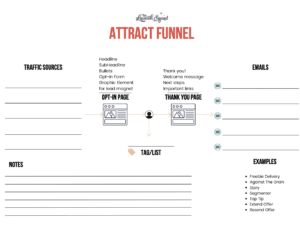
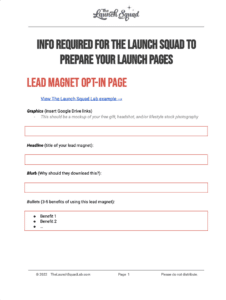
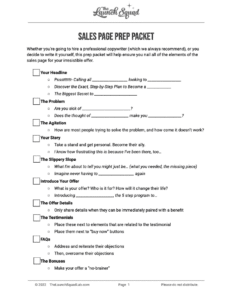
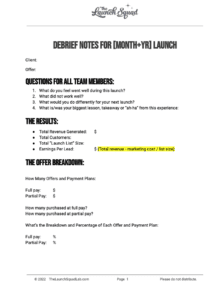
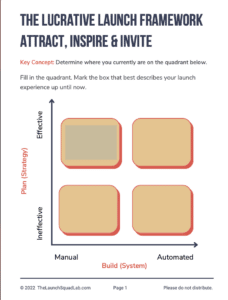
![Marketing Launch Calendar [TEMPLATE]](https://thelaunchsquadlab.com/wp-content/uploads/2023/05/Marketing-Launch-Calendar-TEMPLATE-300x260.png)
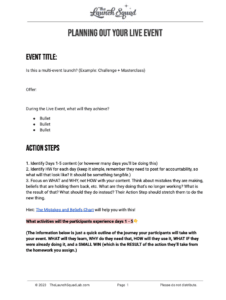
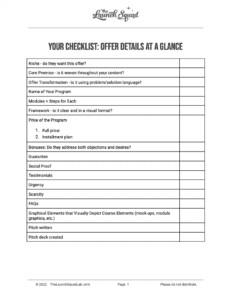
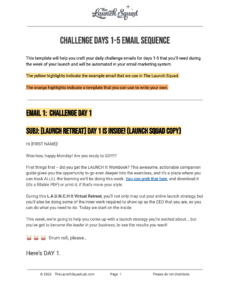
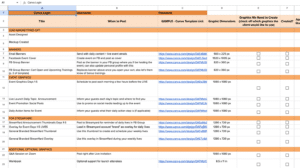
![[Updated] Email Templates for Launch](https://thelaunchsquadlab.com/wp-content/uploads/2023/05/Updated-Email-Templates-for-Launch-223x300.png)
![[REVISED] LS Pitch Script](https://thelaunchsquadlab.com/wp-content/uploads/2023/05/REVISED-LS-Pitch-Script-2023-226x300.png)

